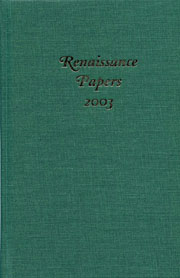Book contents
- Frontmatter
- Contents
- Renaissance Papers
- Homer, Erasmus, and the Problem of Strife
- William Tyndale Among the Demons
- The Printing of “this written book”: G.T. and H.W.'s Editorial Disputes in The Adventures of Master F.J.
- George Puttenham as Comedic Artificer
- Amoret and Scudamour Woo and Wed: Two Courtly Histories and a Stalemate
- Strange Bedfellows: “The Churching of Women” and The Taming of the Shrew
- “Romans, countrymen, and lovers”: Performing Politics, Sovereign Amity and Masculinity in Julius Caesar
- “Rouse Up a Brave Mind”: The Merchant of Venice and Social Uprising in the 1590s
- Revenge Tragedy and Elizabeth Cary's Mariam
- “very worthely sett in printe”: Writing the Virginia Company of London
Strange Bedfellows: “The Churching of Women” and The Taming of the Shrew
Published online by Cambridge University Press: 12 September 2012
- Frontmatter
- Contents
- Renaissance Papers
- Homer, Erasmus, and the Problem of Strife
- William Tyndale Among the Demons
- The Printing of “this written book”: G.T. and H.W.'s Editorial Disputes in The Adventures of Master F.J.
- George Puttenham as Comedic Artificer
- Amoret and Scudamour Woo and Wed: Two Courtly Histories and a Stalemate
- Strange Bedfellows: “The Churching of Women” and The Taming of the Shrew
- “Romans, countrymen, and lovers”: Performing Politics, Sovereign Amity and Masculinity in Julius Caesar
- “Rouse Up a Brave Mind”: The Merchant of Venice and Social Uprising in the 1590s
- Revenge Tragedy and Elizabeth Cary's Mariam
- “very worthely sett in printe”: Writing the Virginia Company of London
Summary
Strange bedfellows indeed. Shakespeare provides us no children in The Taming of the Shrew, and consensus agrees that the three offstage marriages remain unconsummated until after the play's end. No consummations, no children; no children, no Churching. While any connection between The Book of Common Prayers (1559) ceremony for “The Thanksgiving of Women after Childbirth, Commonly Called the Churching of Women” and The Taming of the Shrew seems tenuous, I find significant resonances between these two texts. From its opening the play predicates itself on conforming to social expectations. Both Sly and Katherina must learn to adapt themselves if they are to attain their desires. The physical changes that each experiences through their individual sequestrations force them to examine their exclusion or inclusion in a new community based on one's adherence to societal norms. Similarly, social expectations for both husband and wife surrounding childbirth and “The Thanksgiving” call for conforming to new circumstances and playing appropriate roles. I suggest that the play's presentation of spousal relationships, responsibilities, and duties parallels the social and religious constructs of a required and commonplace church ritual in the Early Modern Period. In Sly's sequestration his bedding serves as prolepsis to what society expects of a woman like Katherina and thus exists as a parody of social and religious observations in complying with “The Thanksgiving,” while Katherina's sequestration from and return to Padua forms not only a parallel but also a paraphrase of those customs.
- Type
- Chapter
- Information
- Renaissance Papers 2003 , pp. 83 - 98Publisher: Boydell & BrewerPrint publication year: 2004

